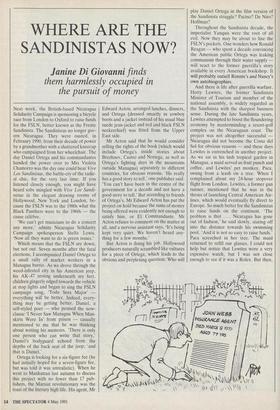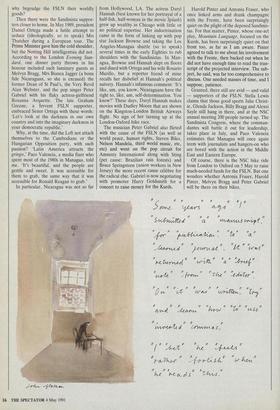WHERE ARE THE SANDINISTAS NOW?
Janine Di Giovanni finds them harmlessly occupied in the pursuit of money
Next week, the British-based Nicaragua Solidarity Campaign is sponsoring a bicycle race from London to Oxford to raise funds for the FSLN, better known as the Frente Sandinista. The Sandinistas no longer gov- ern Nicaragua. They were ousted, in February 1990, from their decade of power by a grandmother with a shattered kneecap who campaigned from her wheelchair. The day Daniel Ortega and his commandantes handed the power over to Mrs Violeta Chamorro was the day one could hear Vive Los Sandinistas, the battle-cry of the radic- al chic, for the very last time. If you listened closely enough, you might have heard sobs mingled with Vive Los Sandi- nistas in the elegant drawing rooms of Hollywood, New York and London, be- cause the FSLN was to the 1980s what the Black Panthers were to the 1960s — the cause célèbre.
'We can't get musicians to do a concert any more,' admits Nicaragua Solidarity Campaign spokesperson Stella Lewis. 'Now all they want to do is green issues.'
Which means that the FSLN are down, but not out. Seven months after the fatal elections, I accompanied Daniel Ortega to a small rally of market workers in a Managua barrio. As we drove through the weed-infested city in his American jeep, his AK-47 resting underneath my feet, children gingerly edged towards the vehicle at stop lights and began to sing the FSLN campaign song, 'Tod° Sera Major' — everything will be better. Indeed, every- thing may be getting better. Daniel, a self-styled poet — who penned the now- classic 'I Never Saw Managua When Mini- skirts Were In' from prison — casually mentioned to me that he was thinking about writing his memoirs. 'There is only one person who can write that story,' Daniel's bodyguard echoed from the depths of the back seat of the jeep, 'and that is Daniel.'
Ortega is looking for a six-figure fee (he had initially hoped for a seven-figure fee, but was told it was unrealistic). When he went to Manhattan last autumn to discuss this project with no fewer than 17 pub- lishers, the Marxist revolutionary was the toast of the literary high life. His agent, Mr Edward Acton, arranged lunches, dinners, and Ortega (dressed smartly in cowboy boots and a jacket instead of his usual blue suede jean-jacket and red and black FSLN neckerchief) was feted from the Upper East side.
Mr Acton said that he would consider selling the rights of the book (which would include Ortega's inside stories about Brezhnev, Castro and Noriega, as well as Ortega's fighting days in the mountains outside Managua) separately to different countries, for obvious reasons. 'He really has a good story to tell,' one publisher said. `You can't have been in the centre of the government for a decade and not have a good story to tell.' But according to friends of Ortega's, Mr Edward Acton has put the project on hold because the sums of money being offered were evidently not enough to satisfy him, or El Commandante. Mr Acton refuses to comment on the matter at all, and a nervous assistant says, 'It's being kept very quiet. We haven't heard any- thing for a few months.' But Acton is doing his job. Hollywood producers naturally scrambled like vultures for a piece of Ortega, which leads to the obvious and perplexing question: Who will play Daniel Ortega in the film version of the Sandinista struggle? Pacino? De Niro? Hoffman?
Throughout the Sandinista decade, the imperialist Yanquis were the root of all evil. Now they may be about to line the FSLN's pockets. One wonders how Ronald Reagan — who spent a decade convincing the American public Ortega was leaking communism through their water supply — will react to the former guerrilla's story available in every American bookshop. It will probably outsell Ronnie's and Nancy's own autobiographies.
And there is life after guerrilla warfare. Herty Lewites, the former Sandinista Minister of Tourism and member of the national assembly, is widely regarded as the Sandinista with the sharpest business sense. During the late Sandinista years, Lewites attempted to boost the floundering economy by masterminding a resort-golf complex on the Nicaraguan coast. The project was not altogether successful — Nicaragua did not become the Costa del Sol for obvious reasons — and these days Lewites is entrenched in another project. As we sat in his lush tropical garden in Managua, a maid served us fruit punch and coffee, and Lewites' pet monkey, Paca, swung from a leash on a tree. When I complained about my 24-hour stopover flight from London, Lewites, a former gun runner, mentioned that he was in the throes of launching Central American Air- lines, which would eventually fly direct to Europe. So much better for the Sandinistas to raise funds on the continent. The problem is that . . . Nicaragua has gone out of fashion,' he said slowly, staring off into the distance towards his swimming pool. 'And it is not so easy to raise funds.' Paca screeched in her tree. The maid returned to refill our glasses. I could not help but notice that Lewites wore a very expensive watch, but I was not close enough to see if it was a Rolex. But then, why begrudge the FSLN their worldly goods?
Then there were the Sandinista suppor- ters closer to home. In May 1989, president Daniel Ortega made a futile attempt to seduce (ideologically, so to speak) Mrs Thatcher during a European tour. The Prime Minister gave him the cold shoulder, but the Notting Hill intelligentsia did not. According to the London Evening Stan- dard, one dinner party thrown in his honour included such luminary guests as Melvyn Bragg, Mrs Bianca Jagger (a bona fide Nicaraguan, so she is excused) the former Dean of St Paul's, the Very Revd Alan Webster, and the pop singer Peter Gabriel with his flaky actress-girlfriend Rosanna Arquette. The late Graham Greene, a fervent FSLN supporter, embraced Senor Ortega with these words: 'Let's look at the darkness in our own country and into the imaginary darkness in your democratic republic.'
Why, at the time, did the Left not attach themselves to the Cambodians or the Hungarian Opposition party, with such passion? 'Latin America attracts the gringo,' Paco Valencia, a media fixer who spent most of the 1980s in Managua, told me. it's beautiful, and the people are gentle and sweet. It was accessible for them to grab, the same way that it was accessible for Ronald Reagan to grab.'
In particular, Nicaragua was not so far from Hollywood, LA. The actress Daryl Hannah (best known for her portrayal of a half-fish, half-woman in the movie Splash) grew up wealthy in Chicago with little or no political expertise. Her indoctrination came in the form of linking up with pop star Jackson Browne and taking the Los Angeles-Managua shuttle (so to speak) several times in the early Eighties to rub shoulders with the Sandinistas. In Man- agua, Browne and Hannah slept on floors and dined with Ortega and his wife Rosario Murillo, but a reporter friend of mine recalls her disbelief at Hannah's political naivety. Hannah's infamous comment: 'It's like, um, you know, Nicaraguans have the right to, like, urn, self-determination. You know?' These days, Daryl Hannah makes movies with Dudley Moore that are shown on the Kingston-London British Airways flight. No sign of her turning up at the London-Oxford bike race.
The musician Peter Gabriel also flirted with the cause of the FSLN (as well as world peace, human rights, Steven Biko, Nelson Mandela, third world music, etc, etc) and went on the pop circuit for Amnesty International along with Sting (pet cause: Brazilian rain forests) and Bruce Springsteen (union workers in New Jersey) the more recent cause célèbre for the radical chic. Gabriel is now negotiating with promoter Harry Goldsmith for a concert to raise money for the Kurds. Harold Pinter and Antonia Fraser, who once linked arms and drank champagne with the Frente, have been surprisingly quiet on the plight of the deposed Sandinis- tas. For that matter, Pinter, whose one-act play, Mountain Language, focused on the Kurds, has been surprisingly quiet on that front too, as far as I am aware. Pinter agreed to talk to me about his involvement with the Frente, then backed out when he did not have enough time to read the tran- script of the projected interview. The sub- ject, he said, was far too comprehensive to discuss. One needed masses of time, and I suppose, patience.
Granted, there still are avid — and valid — supporters of the FSLN. Stella Lewis claims that those good sports Julie Christ- ie, Glenda Jackson, Billy Bragg and Alexei Sayle still hang in there, and at the NSC annual meeting 200 people turned up. The Sandinista Congress, where the comman- dantes will battle it out for leadership, takes place in July, and Paco Valencia estimates that Managua will once again teem with journalists and hangers-on who are bored with the action in the Middle East and Eastern Europe.
Of course, there is the NSC bike ride from London to Oxford on 5 May to raise much-needed funds for the FSLN. But one wonders whether Antonia Fraser, Harold Pinter, Melvyn Bragg and Peter Gabriel will be there on their bikes.



















































 Previous page
Previous page